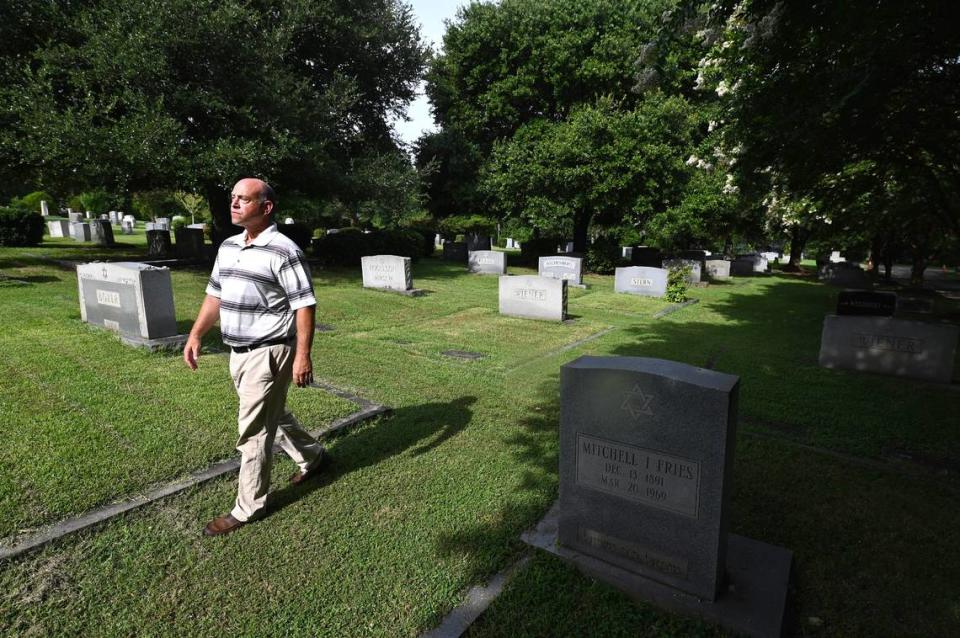Charlotte wants housing to replace vacant school. Jewish cemetery is wary of city’s plans
The Jewish cemetery that’s the final resting place for Charlotteans such as Leon Levine, Harry Golden and Al Rousso faces a potential space crunch as the city looks to redevelop an adjacent property for mixed-income housing.
Leaders of the Hebrew Cemetery of Greater Charlotte, at 1801 Statesville Ave., say they’re disappointed in the possibility the city will sell the former site of Double Oaks School to the “highest bidder for high-density housing” instead of a possible expansion of their own. It would effectively lock the cemetery into a site that will only last for 10 to 15 more years, its leaders say.
And it’s more than a possibility: the city of Charlotte issued a request for proposals last month to build affordable and workforce housing. The deadline is Aug. 31.
The mission is simple for Brian Yesowitch, historical chair of the Hebrew Cemetery of Greater Charlotte.
“We would like to maintain this property as long as we can and continue to add folks to our family of interred loved ones,” Yesowitch said.

Double Oaks most recently served preschoolers before the city bought it in 2018 for more than $3 million. It was the site of an intentionally set fire in 2017, WCNC reported. When the preschool closed, Yesowitch said the cemetery association looked at it as a chance to expand its property and give it the ability to offer burials for a longer period of time.
He said the cemetery association made a purchase proposal several years ago that was rejected. It tried afterward to work directly with the city on a new proposal. Their revised proposal would include redeveloping the Double Oaks property into a “thriving community amenity” with raised garden beds; a gathering gazebo; play and assembly fields; low-density, mixed-income housing connected to the adjoining neighborhoods; and a community center.
Yesowitch said the association feels its proposal hasn’t gone anywhere.
“There’s not been a lot of movement. When the pandemic hit, a lot of things kind of stopped and froze,” Yesowitch said.
The cemetery was created in 1867, when just several thousand people lived in Charlotte. The first two people buried were siblings Willie and Rachel Rintels in 1870, the children of Jacob Rintels, one of the cemetery’s founders. Running out of space is something Yesowitch says could hurt the Jewish community as a whole, with less historical and peaceful space for burials.
“There’s been a lot of antisemitism over the years and in America. Jews weren’t allowed to be buried in other public graveyards in some communities, so there’s also that kind of almost like a refuge and a safe haven for the Jewish community to have their own cemetery,” Yesowitch said.
Others buried there are 13 Civil war soldiers and Nahum Arbel, a painter who was present for the Balfour Declaration, a document advocating for the creation of Israel.
What are Charlotte’s plans?

City spokesman Lawrence Corley said in an email the city wants the adjacent former preschool site to serve “the highest and best use for the property in the context of the needs of the surrounding community and the City’s goals and objectives.”
The housing development is a part of the North Tryon/North Graham playbook. The document, part of the city’s Corridors of Opportunity program, aims to “establish a shared vision for North Graham and North Tryon Street as a vibrant corridor into the city.”
The city’s request also leaves open the ability for developers to build market-rate housing along with more affordable options — saying proposals can include housing that serves people who make more than the area’s median income.
Yesowitch said he hopes the developer leaves some portion of the property open for a cemetery expansion. Otherwise, the cemetery’s options could include having burials in South Carolina or partnering with a Jewish synagogue in Davidson — things he called plausible but not optimal.
The cemetery is independently owned and is not connected to a synagogue. Caretakers manage the property using donations and fundraisers. It is the only community-run and independent cemetery in North Carolina, according to their website.
“I think we have enough donors that will pay the money (for expansion). We’re just hoping that the city will like our bid. I think we have a nice developer that’s put together a plan that hopefully satisfies what they want,” Yesowitch said.

